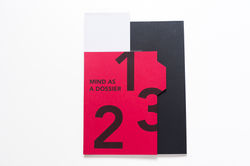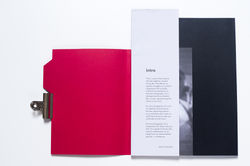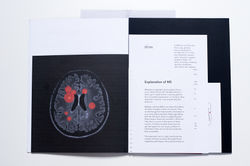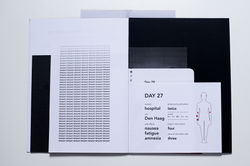Karina/mind as a dossier synopsis: Difference between revisions
(Created page with "<SCRIPT> function passWord() { var testV = 1; var pass1 = prompt('Please Enter Your Password',' '); while (testV < 3) { if (!pass1) history.go(-1); if (pass1.toLowerCase() ==...") |
No edit summary |
||
| (2 intermediate revisions by the same user not shown) | |||
| Line 1: | Line 1: | ||
===A MIND AS A DOSSIER=== | |||
[[File: e-08791.jpg | 250px]] | |||
[[File: e-08792.jpg | 250px]] | |||
[[File: e-08796.jpg | 250px]] | |||
[[File: e-08797.jpg | 250px]] | |||
<br> | |||
<br> | |||
A Mind as a Dossier is a book that’s meant to represent a medical file. The 14x22 cm folder is filled with 132 pages which are in a four different sizes, ranging from 15x10 cm to 21x29 cm. The content is a combination of a medical book, a personal journal, photographs and medical data that captures my first eighteen months after my diagnosis of multiple sclerosis and epilepsy. To capture the honest and authentic chaos in my mind at the time, the events are not described in chronological order. The pages are bound together using a rubber band across the side of the spine and attached to a cover which is an off-red cardboard medical file with a tab. | |||
The journal content was written in retrospective, for therapeutic purposes, but also to have a better understanding of past events. All the medical information was taken from leaflets at hospitals in order to use the right medical facts and terminology, though the typography and layouts were based on medical books for a cleaner look. Infographics were made to visually explain complex medical data regarding medicine doses, pain levels and reading brain scans. To balance the raw scientific feel, photography is used to enrich the personal and emotional aspects. All photos try to capture the split-second moment when falling into a small (absence) seizure - calm and blurry. | |||
The book is not only aimed at other people going through medical troubles to inspire them, but also at family and friends to understand their loved ones better, and a wider audience to educate them about the taboo and misunderstood topics of multiple sclerosis and epilepsy. This dossier becomes an experience as it allows the reader to try to figure out the journey on their own, whilst being put in someone else's shoes. I hope to publish and distribute the book in hospitals to not only spread the word, but also inspire those who are ill to keep marching on. | |||
Latest revision as of 18:47, 17 November 2016
A MIND AS A DOSSIER




A Mind as a Dossier is a book that’s meant to represent a medical file. The 14x22 cm folder is filled with 132 pages which are in a four different sizes, ranging from 15x10 cm to 21x29 cm. The content is a combination of a medical book, a personal journal, photographs and medical data that captures my first eighteen months after my diagnosis of multiple sclerosis and epilepsy. To capture the honest and authentic chaos in my mind at the time, the events are not described in chronological order. The pages are bound together using a rubber band across the side of the spine and attached to a cover which is an off-red cardboard medical file with a tab.
The journal content was written in retrospective, for therapeutic purposes, but also to have a better understanding of past events. All the medical information was taken from leaflets at hospitals in order to use the right medical facts and terminology, though the typography and layouts were based on medical books for a cleaner look. Infographics were made to visually explain complex medical data regarding medicine doses, pain levels and reading brain scans. To balance the raw scientific feel, photography is used to enrich the personal and emotional aspects. All photos try to capture the split-second moment when falling into a small (absence) seizure - calm and blurry.
The book is not only aimed at other people going through medical troubles to inspire them, but also at family and friends to understand their loved ones better, and a wider audience to educate them about the taboo and misunderstood topics of multiple sclerosis and epilepsy. This dossier becomes an experience as it allows the reader to try to figure out the journey on their own, whilst being put in someone else's shoes. I hope to publish and distribute the book in hospitals to not only spread the word, but also inspire those who are ill to keep marching on.
